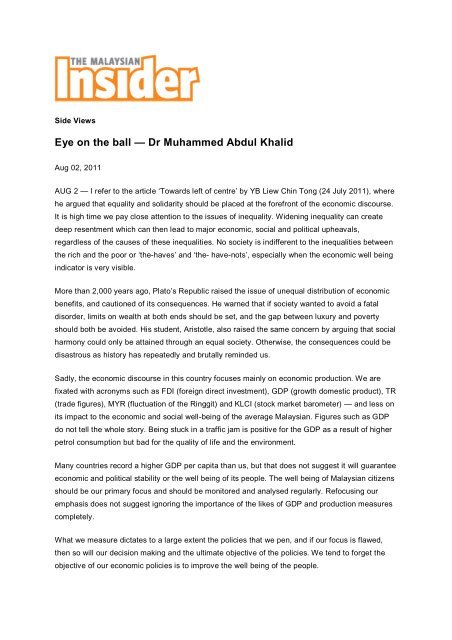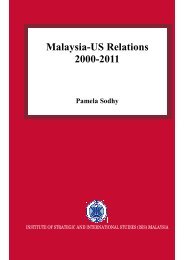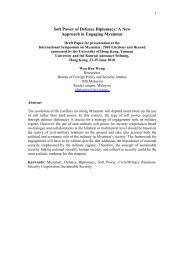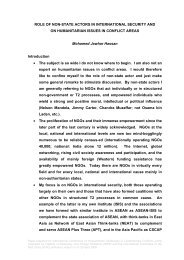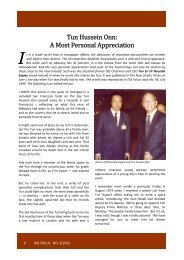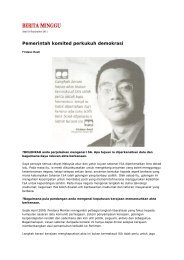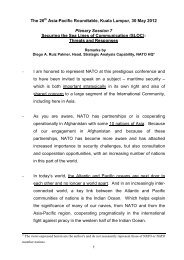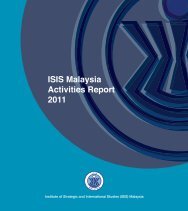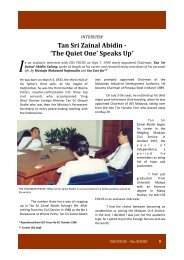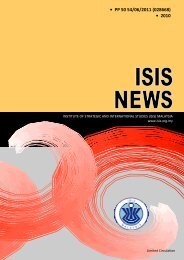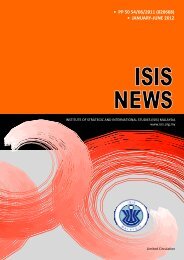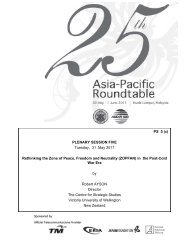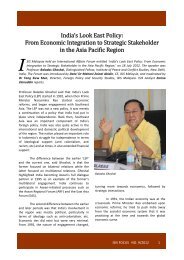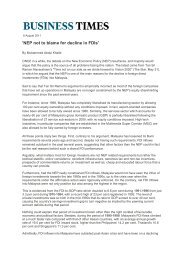Eye on the ball â Dr Muhammed Abdul Khalid - ISIS Malaysia
Eye on the ball â Dr Muhammed Abdul Khalid - ISIS Malaysia
Eye on the ball â Dr Muhammed Abdul Khalid - ISIS Malaysia
You also want an ePaper? Increase the reach of your titles
YUMPU automatically turns print PDFs into web optimized ePapers that Google loves.
Side Views<str<strong>on</strong>g>Eye</str<strong>on</strong>g> <strong>on</strong> <strong>the</strong> <strong>ball</strong> — <strong>Dr</strong> <strong>Muhammed</strong> <strong>Abdul</strong> <strong>Khalid</strong>Aug 02, 2011AUG 2 — I refer to <strong>the</strong> article ‘Towards left of centre’ by YB Liew Chin T<strong>on</strong>g (24 July 2011), wherehe argued that equality and solidarity should be placed at <strong>the</strong> forefr<strong>on</strong>t of <strong>the</strong> ec<strong>on</strong>omic discourse.It is high time we pay close attenti<strong>on</strong> to <strong>the</strong> issues of inequality. Widening inequality can createdeep resentment which can <strong>the</strong>n lead to major ec<strong>on</strong>omic, social and political upheavals,regardless of <strong>the</strong> causes of <strong>the</strong>se inequalities. No society is indifferent to <strong>the</strong> inequalities between<strong>the</strong> rich and <strong>the</strong> poor or ‘<strong>the</strong>-haves’ and ‘<strong>the</strong>- have-nots’, especially when <strong>the</strong> ec<strong>on</strong>omic well beingindicator is very visible.More than 2,000 years ago, Plato’s Republic raised <strong>the</strong> issue of unequal distributi<strong>on</strong> of ec<strong>on</strong>omicbenefits, and cauti<strong>on</strong>ed of its c<strong>on</strong>sequences. He warned that if society wanted to avoid a fataldisorder, limits <strong>on</strong> wealth at both ends should be set, and <strong>the</strong> gap between luxury and povertyshould both be avoided. His student, Aristotle, also raised <strong>the</strong> same c<strong>on</strong>cern by arguing that socialharm<strong>on</strong>y could <strong>on</strong>ly be attained through an equal society. O<strong>the</strong>rwise, <strong>the</strong> c<strong>on</strong>sequences could bedisastrous as history has repeatedly and brutally reminded us.Sadly, <strong>the</strong> ec<strong>on</strong>omic discourse in this country focuses mainly <strong>on</strong> ec<strong>on</strong>omic producti<strong>on</strong>. We arefixated with acr<strong>on</strong>yms such as FDI (foreign direct investment), GDP (growth domestic product), TR(trade figures), MYR (fluctuati<strong>on</strong> of <strong>the</strong> Ringgit) and KLCI (stock market barometer) — and less <strong>on</strong>its impact to <strong>the</strong> ec<strong>on</strong>omic and social well-being of <strong>the</strong> average <strong>Malaysia</strong>n. Figures such as GDPdo not tell <strong>the</strong> whole story. Being stuck in a traffic jam is positive for <strong>the</strong> GDP as a result of higherpetrol c<strong>on</strong>sumpti<strong>on</strong> but bad for <strong>the</strong> quality of life and <strong>the</strong> envir<strong>on</strong>ment.Many countries record a higher GDP per capita than us, but that does not suggest it will guaranteeec<strong>on</strong>omic and political stability or <strong>the</strong> well being of its people. The well being of <strong>Malaysia</strong>n citizensshould be our primary focus and should be m<strong>on</strong>itored and analysed regularly. Refocusing ouremphasis does not suggest ignoring <strong>the</strong> importance of <strong>the</strong> likes of GDP and producti<strong>on</strong> measurescompletely.What we measure dictates to a large extent <strong>the</strong> policies that we pen, and if our focus is flawed,<strong>the</strong>n so will our decisi<strong>on</strong> making and <strong>the</strong> ultimate objective of <strong>the</strong> policies. We tend to forget <strong>the</strong>objective of our ec<strong>on</strong>omic policies is to improve <strong>the</strong> well being of <strong>the</strong> people.
Unfortunately, our c<strong>on</strong>tenti<strong>on</strong> has always been based <strong>on</strong> <strong>the</strong> performance of ec<strong>on</strong>omic policyinstruments, ra<strong>the</strong>r than <strong>on</strong> <strong>the</strong> outcome. The questi<strong>on</strong> which we need to ask ourselves is whe<strong>the</strong>r<strong>the</strong> benefits of our ec<strong>on</strong>omic producti<strong>on</strong> benefit every<strong>on</strong>e equally at <strong>the</strong> end of <strong>the</strong> day?Trickle down ec<strong>on</strong>omyThe Arab Spring revolt occurred due to, am<strong>on</strong>g o<strong>the</strong>r reas<strong>on</strong>s, unequal distributi<strong>on</strong> of ec<strong>on</strong>omicgrowth. We d<strong>on</strong>’t have to look far. Our neighbours down south lost approximately 40 per cent of<strong>the</strong> popular vote, as its citizens felt that high ec<strong>on</strong>omic growth did not benefit <strong>the</strong>m, and nei<strong>the</strong>rdoes <strong>the</strong> high cost of living which inevitably makes daily life harder. Let us not forget thatSingapore has <strong>the</strong> highest GDP per capita in <strong>the</strong> regi<strong>on</strong>, attracts <strong>the</strong> highest inflows of FDI for <strong>the</strong>past few decades, and yet, <strong>the</strong> ruling government was given a bloody nose during <strong>the</strong> last electi<strong>on</strong>.The same could happen in <strong>Malaysia</strong>, despite an expanding ec<strong>on</strong>omy, <strong>the</strong> benefits are scarcelyfelt.For <strong>the</strong> past ten years, despite <strong>the</strong> average GDP growth of about 5.3 per cent p.a, wages grewmuch less, at an annual average of 2.6 per cent. To make matters worse, <strong>the</strong> official inflati<strong>on</strong> rateduring <strong>the</strong> same period grew higher than wages, at an annual average of 3.2 per cent, whichmeans that real wage growth is negative. The distributi<strong>on</strong> of our expanding ec<strong>on</strong>omy is also lopsided.The income gap between <strong>the</strong> top 20 per cent vs. <strong>the</strong> bottom 40 per cent has jumped fromabout RM 659 in 1970 to RM 8,547 in 2009, while <strong>the</strong> urban rural gap is wider than our pre-Merdeka days.While we are engrossed with GDP figures and trade volume, let us not forget that it should benefitall <strong>Malaysia</strong>ns. Although nearly 99 per cent of Peninsular <strong>Malaysia</strong> has electricity coverage, <strong>the</strong>figures for East <strong>Malaysia</strong> is depressing. About 23 per cent of Sabahan households and 33 per centof Sarawakian households have no access to electricity. The same applies to water. Nearly 43 percent of Sabah and Sarawak has no access to clean or treated water compared to <strong>the</strong> approximate11 per cent in Peninsular <strong>Malaysia</strong>.So what should we do and evaluate instead? There are several preliminary suggesti<strong>on</strong>s. First,when evaluating material well-being, we must not just look at producti<strong>on</strong>, but also look at incomedistributi<strong>on</strong> and c<strong>on</strong>sumpti<strong>on</strong> patterns. Sec<strong>on</strong>d, we should emphasise <strong>the</strong> household perspective.While it is useful to track <strong>the</strong> performance of an ec<strong>on</strong>omy as a whole, trends in citizen’s materialliving standards are better followed through measures of household income and c<strong>on</strong>sumpti<strong>on</strong>patterns. Third, we should c<strong>on</strong>sider income and c<strong>on</strong>sumpti<strong>on</strong> trends jointly with wealth, as <strong>the</strong>latter is central to measuring sustainability. Fourth, more prominence should be given to <strong>the</strong>distributi<strong>on</strong> of income, c<strong>on</strong>sumpti<strong>on</strong> and wealth. Fifth, our measurements of inequality in <strong>the</strong>quality of life should be assessed both horiz<strong>on</strong>tally and vertically — across people, income level,socio-ec<strong>on</strong>omic groups, gender and generati<strong>on</strong>s.
We need to set our shared aspirati<strong>on</strong>s straight, be able to measure those aspirati<strong>on</strong>s h<strong>on</strong>estly andmore importantly, be brave enough to act.We, as a society, should focus <strong>on</strong> what we really care about, and assess whe<strong>the</strong>r what we arestriving for is ultimately important to us.As YB Chin T<strong>on</strong>g correctly pointed out, failure to address issues c<strong>on</strong>cerning equality and solidaritycould cause serious harm and have dire c<strong>on</strong>sequences. Vast empirical research has shown thathigh levels of inequality are not <strong>on</strong>ly detrimental to future growth but damaging to <strong>the</strong> stability of<strong>the</strong> nati<strong>on</strong>. If left unchecked, <strong>the</strong> c<strong>on</strong>sequences could be dire.Let us keep our eye <strong>on</strong> <strong>the</strong> <strong>ball</strong>.* <strong>Dr</strong> <strong>Muhammed</strong> <strong>Abdul</strong> <strong>Khalid</strong> is a research fellow with UKM. This is <strong>the</strong> pers<strong>on</strong>al opini<strong>on</strong> of <strong>the</strong>writer.* This is <strong>the</strong> pers<strong>on</strong>al opini<strong>on</strong> of <strong>the</strong> writer or publicati<strong>on</strong>. The <strong>Malaysia</strong>n Insider does not endorse<strong>the</strong> view unless specified.


